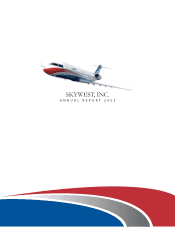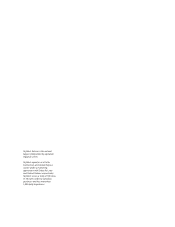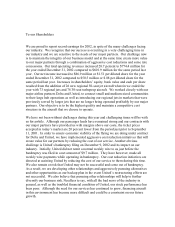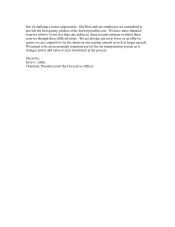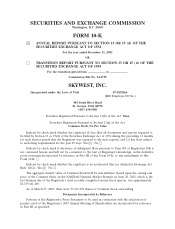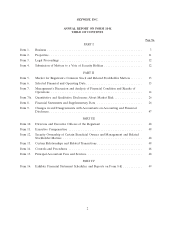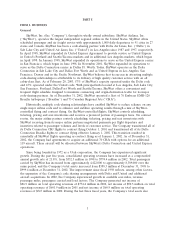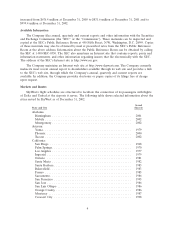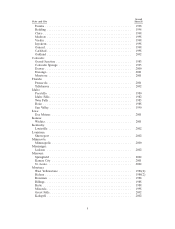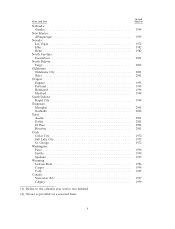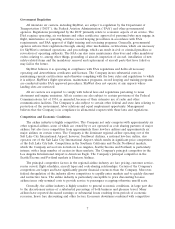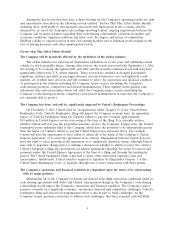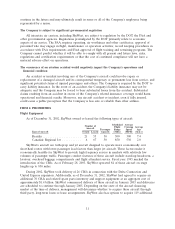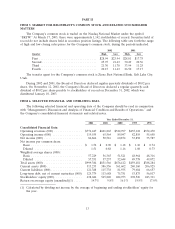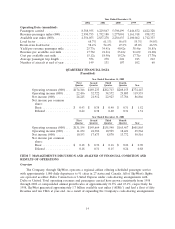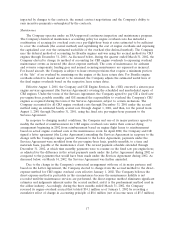SkyWest Airlines 2002 Annual Report Download - page 11
Download and view the complete annual report
Please find page 11 of the 2002 SkyWest Airlines annual report below. You can navigate through the pages in the report by either clicking on the pages listed below, or by using the keyword search tool below to find specific information within the annual report.Government Regulation
All interstate air carriers, including SkyWest, are subject to regulation by the Department of
Transportation (‘‘DOT’’), the Federal Aviation Administration (‘‘FAA’’) and other governmental
agencies. Regulations promulgated by the DOT primarily relate to economic aspects of air service. The
FAA requires operating, air worthiness and other certificates; approval of personnel who may engage in
flight, maintenance or operating activities; record keeping procedures in accordance with FAA
requirements; and FAA approval of flight training and retraining programs. Generally, governmental
agencies enforce their regulations through, among other mechanisms, certifications, which are necessary
for SkyWest’s continued operations, and proceedings, which can result in civil or criminal penalties or
revocation of operating authority. The FAA can also issue maintenance directives and other mandatory
orders relating to, among other things, grounding of aircraft, inspection of aircraft, installation of new
safety-related items and the mandatory removal and replacement of aircraft parts that have failed or
may fail in the future.
SkyWest believes it is operating in compliance with FAA regulations and holds all necessary
operating and airworthiness certificates and licenses. The Company incurs substantial costs in
maintaining current certifications and otherwise complying with the laws, rules and regulations to which
it is subject. SkyWest’s flight operations, maintenance programs, record keeping and training programs
are conducted under FAA approved procedures. SkyWest does not operate at any airports where
landing slots are restricted.
All air carriers are required to comply with federal laws and regulations pertaining to noise
abatement and engine emissions. All air carriers are also subject to certain provisions of the Federal
Communications Act of 1934, as amended, because of their extensive use of radio and other
communication facilities. The Company is also subject to certain other federal and state laws relating to
protection of the environment, labor relations and equal employment opportunity. Management
believes that the Company is in compliance in all-material respects with these laws and regulations.
Competition and Economic Conditions
The airline industry is highly competitive. The Company not only competes with approximately six
other regional airlines, some of which are owned by or are operated as code sharing partners of major
airlines, but also faces competition from approximately three low-fare airlines and approximately six
major airlines on certain routes. The Company is the dominant regional airline operating out of the
Salt Lake City International Airport; however, Southwest Airlines, a national low-fare airline, also
operates out of the Salt Lake City International Airport, which results in significant price competition
at the Salt Lake City hub. Competition in the Southern California and Pacific Northwest markets,
which the Company serves from its hubs in Los Angeles, Seattle/Tacoma and Portland, is particularly
intense, with a large number of carriers in these markets. The Company’s principal competitor in the
Los Angeles International Airport is American Eagle. The Company’s principal competitor in the
Seattle/Tacoma and Portland markets is Horizon Airlines.
The principal competitive factors in the regional airline industry are fare pricing, customer service,
routes served, flight schedules, aircraft types and code-sharing relationships. Certain of the Company’s
competitors are larger and have significantly greater financial resources than the Company. Moreover,
federal deregulation of the industry allows competitors to rapidly enter markets and to quickly discount
and restructure fares. The airline industry is particularly susceptible to price discounting because
airlines incur only nominal costs to provide service to passengers occupying otherwise unsold seats.
Generally, the airline industry is highly sensitive to general economic conditions, in large part due
to the discretionary nature of a substantial percentage of both business and pleasure travel. Many
airlines have reported decreased earnings or substantial losses resulting from periods of economic
recession, heavy fare discounting and other factors. Economic downturns combined with competitive
7

